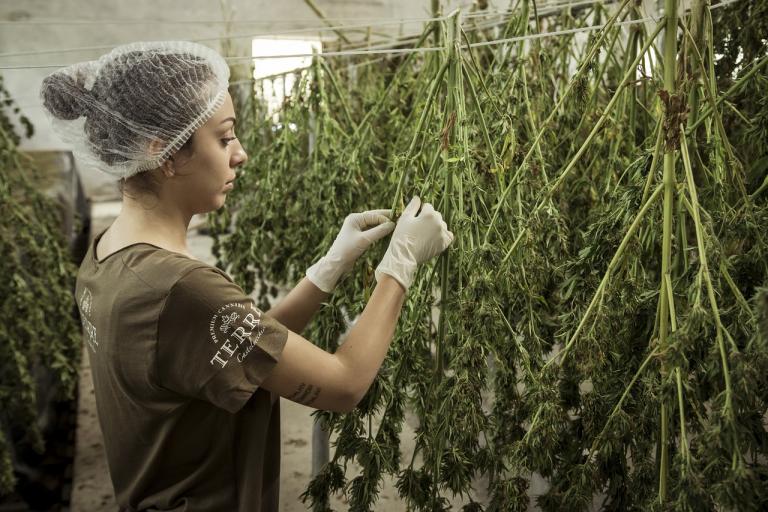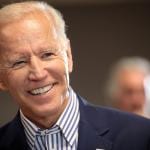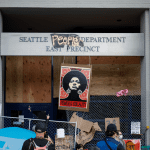Oklahoma, where I grew up and where I live, is one of the most conservative states in the union, with two-thirds of the population voting for Donald Trump. It has also become the nation’s hottest marijuana market. This sounds like a contradiction, but is not.
Politico has published a cover story by Paul Demko entitled How One of the Reddest States Became the Nation’s Hottest Weed Market, with the deck, “Oklahoma entered the world of legal cannabis late, but its hands-off approach launched a boom and a new nickname: ‘Toke-lahoma.’” It’s a fascinating and instructive read. I will add my report from the scene.
Just two years ago, Oklahomans approved by a 57% margin a referendum to legalize medical marijuana. That’s not unusual. Lots of states have done that. But usually, medical marijuana laws specify certain conditions that you must have, which marijuana has been shown to help with, such as chemotherapy for cancer or glaucoma. But under Oklahoma’s law, there are no qualifying conditions. You only need to affirm that you think marijuana would help you with some ailment that you have. You only need to get a doctor of some kind to agree and to sign your form.
Things have unfolded exactly as I predicted they would in my 2018 blog post after the vote. Individuals with a medical degree have set up shop to sign people’s forms. It used to cost $150, but, according to Demko, competition has driven that down to as little as $60. Popular complaints include “backache!” “insomnia!” and “anxiety!” Dispensaries bring doctors on site weekly to consult with marijuana patients. You can even take care of this online. I’ve not heard of anyone getting turned down. You then mail the form into the state with a $100 fee–just $20 if you’re on Medicare–and within a few days you will be on the road to Marrakesh.
What Oklahoma has done, in effect, is to create a third alternative to medical and recreational legalization: Licensing. You must get a license to buy marijuana, and then you can.
Demko reports that one out of ten Oklahomans has a marijuana card, making Oklahoma the largest per capita market in the country for medical marijuana. In second place is New Mexico, with a 5% share. There are now, in a matter of just two years, some 2,000 marijuana dispensaries in the state, many in store fronts and strip malls that had been boarded up. Sophisticated, upscale Colorado next door, which has recreational marijuana, has a population that is 50% larger, but fewer than half as many dispensaries.
I can report that when you drive through rural Oklahoma, you will pass through many tiny communities that consist only of a grain elevator, a gas station, and a Baptist church. Now, in addition, you will often find a marijuana dispensary.
The Oklahoma law also requires that marijuana sold in the state must be grown there. So our agricultural prowess has turned to growing the stuff. We now have 6,000 growing operations. Colorado has one-fifth as many. And Demko reports that the quality, variety, and potency of Oklahoma’s crop is very high indeed.
The little town where we live, population 6,000, has two dispensaries. Two big buildings in our mostly-boarded up downtown have been turned into indoor growing facilities. The owner of that operation and of one of the shops is our mayor.
This may seem odd and paradoxical. Demko quotes a marijuana entrepreneur from out of state who came to Oklahoma for this rolled gold rush. “Turns out, rednecks love to smoke weed.” But this should not be surprising. As I’ve blogged about numerous time, rural, working class white people–Oklahoma’s mainstream–is the demographic that is most inclined to drug abuse, as well as other pathologies. Marijuana is at least better for them than the opiates that had been their drug of choice, with pain pills and heroin destroying countless lives.
And it turns out that Oklahoma’s conservatism is, in fact, the key to the success of its marijuana industry. We really do believe in the free market in Oklahoma. A license to grow or sell marijuana can be purchased for $2,500. In next door Arkansas, it cost $100,000. There are no limits to the number of business licenses a person can have, nor the number of businesses that can exist in a jurisdiction. Louisiana only allows one dispensary in each of the state’s nine regions. Whereas in other states, companies representing big cannabis are suing each other to gain entry into the highly-regulated markets, in Oklahoma, the little guy can open a business with a credit card.
There is also a cultural difference in the use of the drug. The license approach seems to make marijuana more for adults than young people. Even for old folks. A big part of the market is us aging Baby Boomers, many of whom have experience with the weed from the Sixties and who now are turning to its consolations in their twilight years. I’m told that pot has become a staple of retirement communities. And, again, if you are retired and on Medicare, a card only costs $20.
More broadly, people are indeed self-medicating. But it is not a social lubricant, as it was in a lot of these patients’ misspent youths. You don’t see joints being passed around at rodeos. Or the stash brought out when neighbors come to call.
As far as I can tell–and I should probably emphasize that I have not availed myself of this benefit of being an Oklahoman–the use of the drug here seems pretty discreet and under control. I haven’t even heard of driving under the influence problems, though there must be cases of that. And, yes, I know good, conservative Christians who do avail themselves of this medication.
The point is, Oklahoma’s free market, low regulation, pro-liberty conservatism has created the most successful marijuana industry in the country.
I can’t help but be proud of that, though I’m not in favor of drugs.
The main moral case against them is that they are illegal–so that they entangle you in the murderous criminal drug trade–and that they harm your mind and your body. If the drug is not illegal and not too harmful, what is the moral basis for rejecting it completely?
The Bible allows for alcohol, though, and marijuana is arguably not that different. I think of the balanced perspective given in the Book of Proverbs, which says that king and, by extension, those who have important responsibilities should not take strong drink, lest they forget their duties and pervert justice. But we should give the poor and the suffering a break:
Give strong drink to the one who is perishing,
and wine to those in bitter distress;
let them drink and forget their poverty
and remember their misery no more. (Proverbs 31:6-7)
This sounds like a lot of Oklahomans.
Image by Terre Di Cannabis from Pixabay














